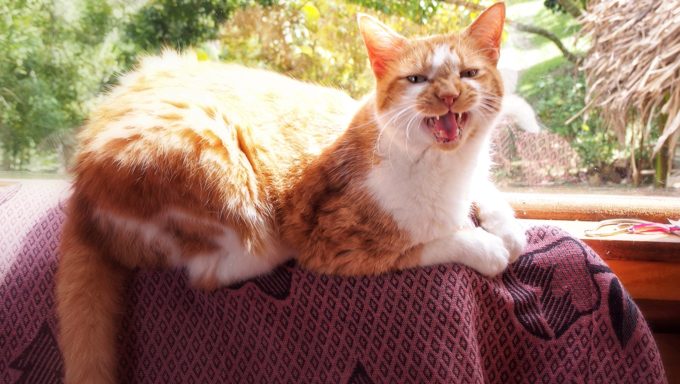Some cats suffer from depression and anxiety just as humans do. And, like humans, different cats benefit from different forms of treatment. Prozac is one such treatment that you may be familiar with.
Prozac is a brand name for the drug fluoxetine hydrochloride, and the version for cats is often sold under the brand name Reconcile.
Before you provide any treatment to your cat, talk to your veterinarian. They can give your kitty a proper diagnosis and recommend treatment, including fluoxetine hydrochloride if they deem it appropriate. Discuss whether or not your cat needs Prozac, or if other options address your cat’s issues in a healthy way.
Here are a few things to think about when it comes to cats and Prozac.
Does Your Cat Suffer From Anxiety Or Depression?
Is your cat suddenly attacking visitors or licking themselves uncontrollably? Your kitty may be suffering from anxiety or depression.
Some cats develop behavior problems that many pet parents find themselves unable to help or resolve. Keep an eye out for the following symptoms of feline anxiety or depression and get help for your cat:
- Stopped using the litter box for any reason other than an actual physical injury or something that prevents them from getting into the litter box
- Acting overly timid or fearful
- Marking with urine outside of the litter box
- Any behaviors that you consider to be outside of the norm, harmful, or problematic
- Compulsive disorders like excess licking or scratching, especially when it results in the cat pulling out their own fur
- Acting angry or overly aggressive
Many pet parents think twice about placing their pets on medication. However, medication may be the only solution to make your cat feel better and enhance positive behavior modification.
According to Pets.WebMd, there are four types of medicines used to treat behavior problems in cats. These medicines are benzodiazepines, monoamine oxidase inhibitors (MAOIs), tricyclic antidepressants and selective serotonin reuptake inhibitors (SSRIs), including Prozac.
Many pet parents find success when treatment combines medication and behavior modification.
Can Behavior Modification Help Your Cat?

Before you consider medication, the most effective and first step in treating the issue is behavior modification. Consult with your veterinarian or pet behaviorist and draw up a behavior modification plan designed by knowledgeable, qualified professionals.
These plans often include things like:
- Working with experts to help change your cat’s perception of a problem or situation
- Establishing new consequences for behavior
- Creating acceptable outlets for your cat’s natural behavior
- Giving your cat something else to do to replace the problem behavior
Unfortunately, behavior modification does not always work.
For example, your household may have multiple cats. Yet, cats are solitary hunters, and although they sometimes get along, it’s normal for them to avoid each other. Because living together isn’t natural for them, it’s sometimes necessary to help cats in a single household learn to accept each other.
Experts suggests accomplishing this through a behavior modification procedure called, “desensitization and counter conditioning (DSCC).” This won’t work with all cats, and that’s when medication can help so that you can work on the behavior modification and counter conditioning.
Medication serves to reduce the emotional part of the issue, but it often fails to resolve the behavioral component.
For instance, medication may help your cat be less emotionally reactive to another cat in your household, but it may not be effective enough to help them learn to use the litter box again if they’ve stopped using it and started using your bed or a rug instead.
What Resources Help You Find Out If Your Cat Needs Prozac?

Numerous advice forums including Ask.Metafiler focus on cat parents and their advice or questions regarding medication. In one particular forum, an anonymous cat owner shares a story:
“Our friend had a cat that had a problem with peeing on the stove. Prozac has calmed her right down (the cat, not the friend). They tried taking her off Prozac a couple of times, but it led to stove peeing, so it looks like she’s (on the medication) for life. They (the owners) are not totally happy about this, but count it a small price to pay for a) having a happy cat and b) being able to use the stove without filling the house with ungodly stench.”
According to the ASPCA, if your cat suffers from fear, anxiety, compulsive or violent behavior and you consider medications, consult a Certified Applied Animal Behaviorist (CAAB or ACAAB) or a board-certified veterinary behaviorist (Dip ACVB), first.
These kinds of experts have a lot of experience with these issues and can give you advice and help you come up with a treatment plan and adjust the plan based on results.
Has your cat ever had behavioral problems? Did you treat them with medication, behavior modification, or both? Let us know in the comments below!









